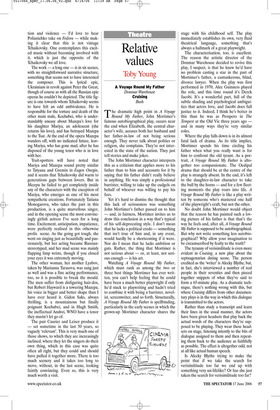Relative values
Toby Young
A Voyage Round My Father Donmar Warehouse Cruising Bush The dramatic high point in A Voyage Round My Father, John Mortimer’s famous autobiographical play, occurs near the end when Elizabeth, the central character’s wife, accuses both her husband and her father-in-law of not being serious enough. They never talk about politics or religion, she complains. They’re not interested in the state of the nation. They just tell stories and make jokes.
The John Mortimer character interprets this as a criticism that applies more to his father than to him and accounts for it by saying that his father didn’t really believe in anything. He was simply a professional barrister, willing to take up the cudgels on behalf of whoever was willing to pay his fees.
Yet it’s hard to dismiss the thought that this lack of seriousness was something John Mortimer’s father passed on to him — and, in fairness, Mortimer invites us to draw this conclusion in a way that’s typical of his self-deprecating style. I don’t mean that he lacks a political credo — something that isn’t true of him and, in any event, would hardly be a shortcoming if it were. Nor do I mean that he lacks ambition or guts. Rather, the thing that Mortimer is not serious about — or, at least, not serious enough — is his art.
Watching A Voyage Round My Father, which must rank as among the two or three best things Mortimer has ever written, you can’t help feeling that he could have been a much better playwright if only he’d stuck to playwriting and hadn’t tried to combine it with being a barrister, novelist, screenwriter, and so forth. Structurally, A Voyage Round My Father is spellbinding, particularly in the early scenes in which the grown-up Mortimer character shares the stage with his childhood self. The play immediately establishes its own, very fluid theatrical language, something that’s always a hallmark of a great playwright.
The characterisation, too, is excellent. The reason the artistic director of the Donmar Warehouse decided to revive this play, I suspect, is that he knew he’d have no problem casting a star in the part of Mortimer’s father, a cantankerous, blind, divorce lawyer. When the play was first performed in 1970, Alec Guinness played the role, and this time round it’s Derek Jacobi. It’s a wonderful part, full of the subtle shading and psychological ambiguities that actors love, and Jacobi does full justice to it. Indeed, I think he’s better in this than he was as Prospero in The Tempest at the Old Vic three years ago and in many ways they’re very similar roles.
Where the play falls down is in its almost fatal lack of drama. As its title implies, Mortimer spends his time circling his father when what you really want is for him to confront the old tyrant. As a portrait, A Voyage Round My Father is altogether too compassionate. The Oedipal drama that should be at the centre of the play is strangely absent. In the end, it’s left to the daughter-in-law character to take the bull by the horns — and for a few fleeting moments the play roars into life. A Voyage Round My Father is like a play written by someone who’s mastered one half of the playwright’s craft, but not the other.
No doubt John Mortimer would object that the reason he has painted such a loving picture of his father is that that’s the way he feels and, after all, A Voyage Round My Father is supposed to be autobiographical. But why not write something less autobiographical? Why allow your imagination to be circumscribed by fealty to the truth?
The tyranny of verisimilitude is even more evident in Cruising, a new play about the septuagenarian dating scene. The person credited as the ‘writer’ is Alecky Blythe, but, in fact, she’s interviewed a number of real people in their seventies and then pieced together snippets of what they’ve said to form a 65-minute play. As a dramatic technique, there’s nothing wrong with this, but where Cruising differs from other documentary plays is in the way in which this dialogue is transmitted to the actors.
Rather than study a transcript and learn their lines in the usual manner, the actors have been given headsets that play back the actual words of the characters they’re supposed to be playing. They wear these headsets on stage, listening intently to the bits of dialogue assigned to them and then repeating them back to the audience as faithfully as possible. The effect is altogether odd, not at all like actual human speech.
Is Alecky Blythe trying to make the point that if we take the search for verisimilitude too far we end up with something very un-lifelike? Or has she just taken the search for verisimilitude too far?


















































































 Previous page
Previous page